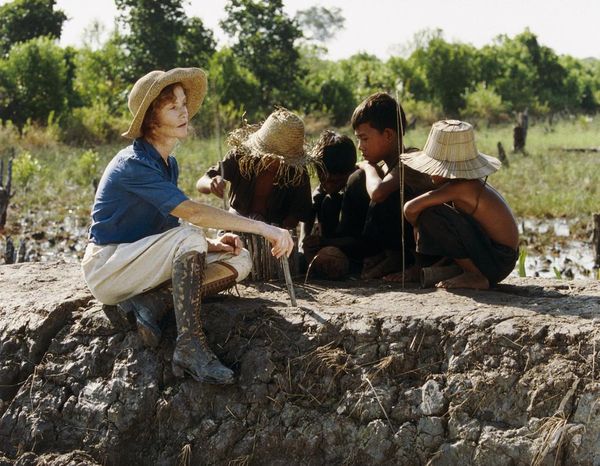Eye For Film >> Movies >> The Sea Wall (2008) Film Review
The Sea Wall
Reviewed by: Jennie Kermode

Cambodia in the late 1940s. The land is divided up by French officials and given to colonial families to supervise. Villagers may continue to work there yet have no right of ownership. A climate of unrest is gradually developing, paralleled by the awkward restlessness of the colonial families, many of which cannot afford to live anywhere else. Our story follows a widow who is struggling to keep her farm going after salt water floods her rice crops. She's no pushover, working hard to organise the building of a new sea wall, but in the meantime her personal life is crumbling, her children getting ready to leave the nest, and her health is failing. How long can she or any of those like her hold back the tide of history?
With its bullying officials and vicious enforcers, this may seem a familiar critique of colonialism, but it's given added bite by the fact it's semi-autobiographical, drawing on author Marguerite Duras' childhood experiences. The interesting thing about Duras' autobiography is that she revisited it several times in different novels, each time viewing it from a different angle and making it look very different. Here the tone isn't sympathetic to anybody (except perhaps the villagers), and Panh's distanced handling of the story enables many of those complex, contested interpretations to be visible within just this one film.

As the widow, Isabelle Huppert takes the delicacy and grace that made her a star and reinvents it as wastedness, as brutalisation, her skinny frame bearing bruised and mottled skin, her eyes permanently in shadow. She's cruel, exploitative, prone to fits of anger, yet we see something of the despair that has occasioned this, and also of the positive relationship she has with the locals who clearly prefer her to other would-be masters. Contributing foreign knowledge of matters like medicine and engineering, she actually has something to trade for their labour. Not so her main rival, the duplicitous Mr Jo (Randal Douc), a wealthy Chinese man who aspires to be just like the white people even if they will never truly accept him. He's happy to exploit the locals, yet he too has a vulnerable side, which we see through his desperate wooing of the widow's daughter Suzanne (Astrid Berges-Frisbey). Rounding out the group is son Joseph (Gaspard Ulliel), frustrated and struggling to assert his masculine identity, gradually discovering that he, like his sister, can benefit from being an object of desire.
The Sea Wall is rambling as stories like this tend to be. It has some vivid moments but there are long stretches when nothing much seems to happen (perhaps a necessary means of conjuring up the colonial malaise). Throughout there is a powerful sense of place and of the alien relationship our heroine still has with a land where she has lived for many years. It's impossible to view this community without thinking of what would come after: the Khmer Rouge, the killing fields. It's rather like spending two and a half hours looking at a bomb, wondering when it will go off, though we never see the explosion (and Duras' book was written before it came).
Though it's far from the strongest of films on this subject, The Sea Wall genuinely has something fresh to contribute, if only by way of its conflictedness.
Reviewed on: 09 Jan 2010

















